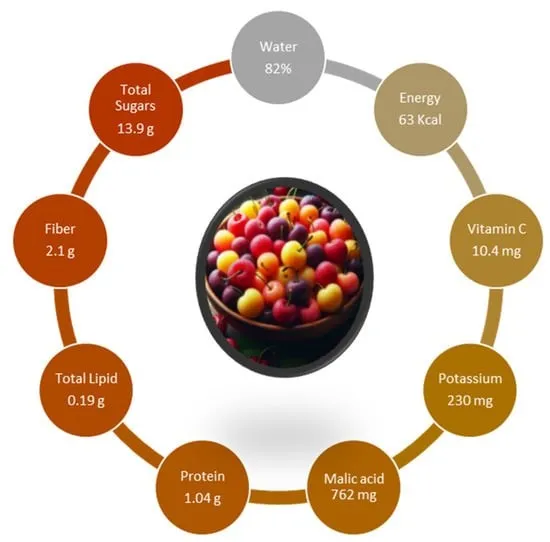Cherries are appreciated by consumers worldwide for their distinctive appearance, crunchiness, and flavor. However, this fruit is not just pleasing to the palate; there is much more beneath the surface. Cherries are nutrient-rich fruits, renowned for their abundance of beneficial compounds. They are an exceptional source of fiber, vitamins, minerals, and polyphenols, all plant-based compounds recognized for their anti-inflammatory and antioxidant properties.
Research has shown that the polyphenol content in cherry cultivars can vary, but generally, all varieties are classified as rich in anthocyanins and flavonoids. In addition to polyphenols, sweet cherries contain carotenoid compounds like β-carotene and vitamin C, which enhance their antioxidant capabilities.
These compounds are essential in preventing oxidative stress, a condition linked to a range of chronic diseases, including cancer, cardiovascular diseases, and diabetes. In terms of numbers, the nutritional composition of cherries per 100g of fresh product consists of 82% water, 10.4 mg of vitamin C, 230 mg of potassium, and 2.1 g of fiber, totaling 63 kcal.
 Image 1: Nutritional composition referring to 100g of cherries.Therefore, sweet cherries, thanks to a diverse selection of bioactive nutrients, promote a variety of physiological functions, such as improving gastrointestinal health, post-workout recovery, better sleep modulation, and support for metabolic health, weight management, and skin health. The potential of cherries to prevent and manage these conditions is emphasized by recent studies that have highlighted their health properties, attributed to their broad profile of specialized metabolites.
Image 1: Nutritional composition referring to 100g of cherries.Therefore, sweet cherries, thanks to a diverse selection of bioactive nutrients, promote a variety of physiological functions, such as improving gastrointestinal health, post-workout recovery, better sleep modulation, and support for metabolic health, weight management, and skin health. The potential of cherries to prevent and manage these conditions is emphasized by recent studies that have highlighted their health properties, attributed to their broad profile of specialized metabolites.
Cherries are also beneficial for blood sugar management due to their low glycemic index and fiber content, which promote a healthy gut flora and aid digestion. A holistic approach to cherries consumption involves considering the various aspects of health and well-being they can influence, incorporating them into a balanced diet, and understanding their benefits beyond mere nutrition. Cherries can be consumed fresh, dried, in juice form, or as a supplement.
 Image 2: Summary of the human health effects of consuming cherries and associated products. Click on this link to access the table: https://www.mdpi.com/2072-6643/16/21/3660.
Image 2: Summary of the human health effects of consuming cherries and associated products. Click on this link to access the table: https://www.mdpi.com/2072-6643/16/21/3660.
Each form offers different benefits and can be chosen based on personal preferences and dietary needs. Just one cup of sweet cherries (150 grams) contains substantial amounts of essential nutrients, such as potassium, vitamin C, and dietary fiber, all of which contribute to overall health. The results so far clearly demonstrate the numerous advantages of consuming cherries.
However, there are some limitations in the studies conducted, and it is crucial to acknowledge them. For example, the significant variability in study designs and sample sizes of the fruits considered makes it difficult to generalize the results. Furthermore, there is a need for more comprehensive clinical studies to confirm the long-term health benefits of consuming sweet cherries, as much of the evidence so far comes from short-term studies.
Additionally, future research should investigate the mechanisms of action of the bioactive compounds in sweet cherries, particularly in different populations and specific health conditions. Finally, it is important to understand whether and which cultivation techniques could increase the synthesis of specialized metabolites in sweet cherries, thereby enhancing their potential impact on human health.
The findings provide a foundation for further investigation into the therapeutic potential of sweet cherries, offering valuable insights for healthcare professionals and researchers.
Source: Gonçalves, B.; Aires, A.; Oliveira, I.; Baltazar, M.; Cosme, F.; Afonso, S.; Pinto, T.; Anjos, M.R.; Inês, A.; Morais, M.C.; et al. From Orchard to Wellness: Unveiling the Health Effects of Sweet Cherry Nutrients. Nutrients 2024, 16, 3660. https://doi.org/10.3390/nu16213660.
Images: Goncalves et al. 2024
Melissa Venturi
University of Bologna (IT)
Cherry Times - All rights reserved












